Critical Reflection: Nursing Abdominal Assessment Performance
VerifiedAdded on 2022/11/09
|6
|1346
|260
Report
AI Summary
This report presents a critical reflection on a nursing student's experience performing an abdominal assessment. The student initially felt confident but struggled when questioned by the assessor, leading to feelings of discouragement. Through reflection, the student identifies anxiety and nervousness as key factors impacting performance. The report highlights the importance of communication, critical thinking, and evidence-based practice, referencing the NMBA Standards of Practice. The student analyzes the role of bowel sounds in abdominal assessments and the implications of hypoactive or hyperactive sounds. The reflection emphasizes the need for improved interpersonal communication skills and the application of evidence-based research to enhance nursing performance and patient care. The student outlines an action plan, including reviewing NMBA standards and clinical guidelines, and developing personal goals for improved communication and research engagement to prevent errors and improve patient outcomes. References from various sources like The Royal Children’s Hospital Melbourne are included.
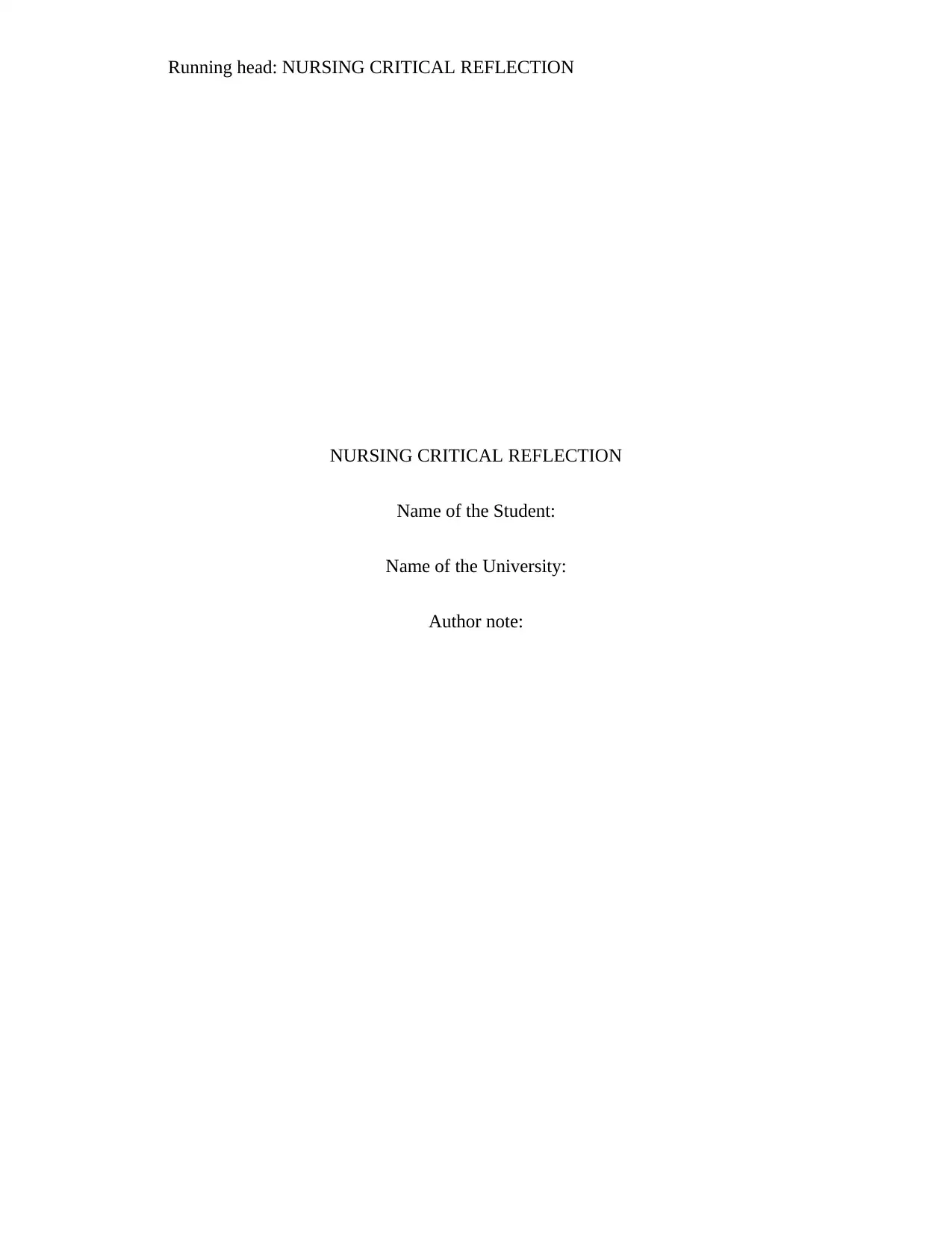
Running head: NURSING CRITICAL REFLECTION
NURSING CRITICAL REFLECTION
Name of the Student:
Name of the University:
Author note:
NURSING CRITICAL REFLECTION
Name of the Student:
Name of the University:
Author note:
Paraphrase This Document
Need a fresh take? Get an instant paraphrase of this document with our AI Paraphraser
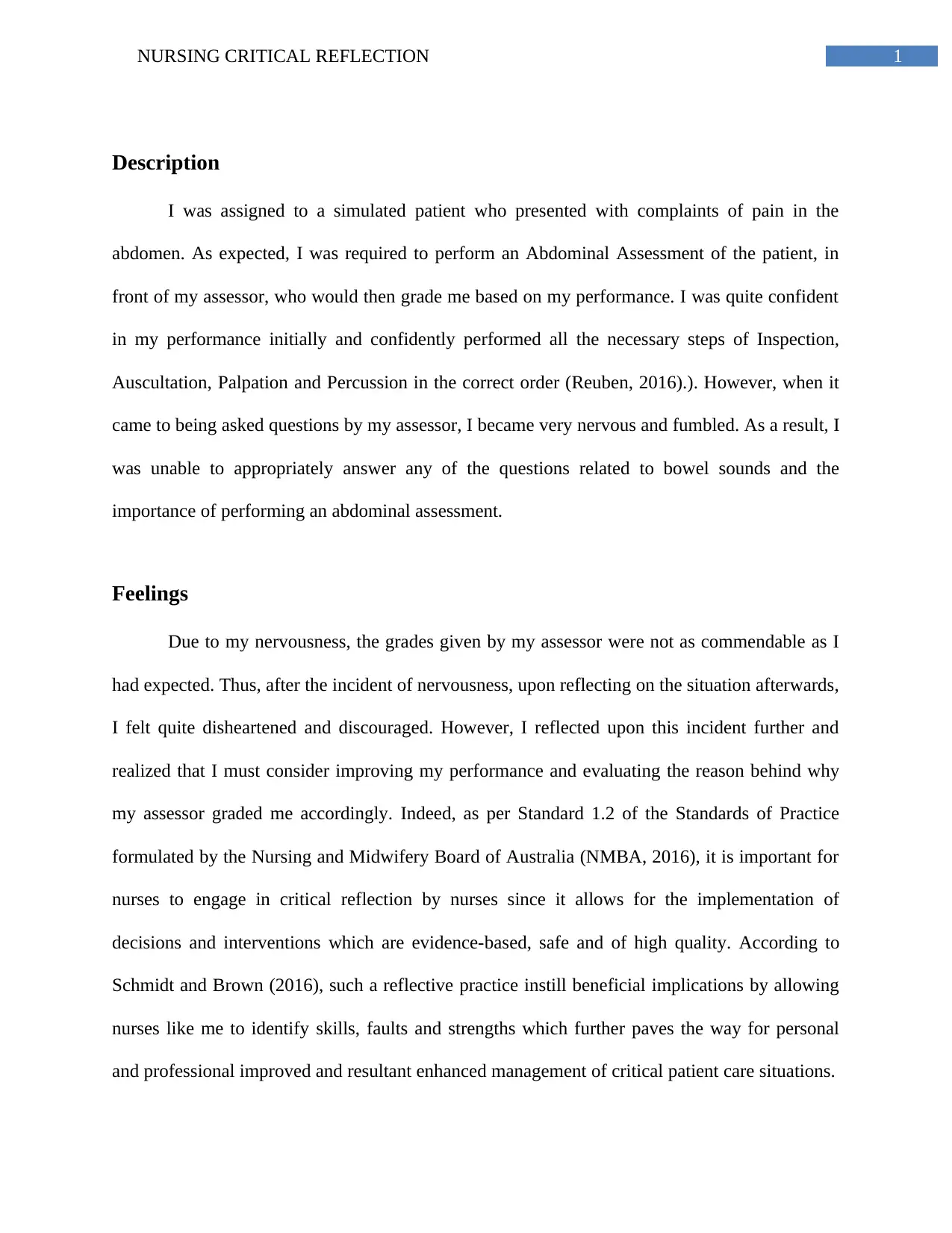
1NURSING CRITICAL REFLECTION
Description
I was assigned to a simulated patient who presented with complaints of pain in the
abdomen. As expected, I was required to perform an Abdominal Assessment of the patient, in
front of my assessor, who would then grade me based on my performance. I was quite confident
in my performance initially and confidently performed all the necessary steps of Inspection,
Auscultation, Palpation and Percussion in the correct order (Reuben, 2016).). However, when it
came to being asked questions by my assessor, I became very nervous and fumbled. As a result, I
was unable to appropriately answer any of the questions related to bowel sounds and the
importance of performing an abdominal assessment.
Feelings
Due to my nervousness, the grades given by my assessor were not as commendable as I
had expected. Thus, after the incident of nervousness, upon reflecting on the situation afterwards,
I felt quite disheartened and discouraged. However, I reflected upon this incident further and
realized that I must consider improving my performance and evaluating the reason behind why
my assessor graded me accordingly. Indeed, as per Standard 1.2 of the Standards of Practice
formulated by the Nursing and Midwifery Board of Australia (NMBA, 2016), it is important for
nurses to engage in critical reflection by nurses since it allows for the implementation of
decisions and interventions which are evidence-based, safe and of high quality. According to
Schmidt and Brown (2016), such a reflective practice instill beneficial implications by allowing
nurses like me to identify skills, faults and strengths which further paves the way for personal
and professional improved and resultant enhanced management of critical patient care situations.
Description
I was assigned to a simulated patient who presented with complaints of pain in the
abdomen. As expected, I was required to perform an Abdominal Assessment of the patient, in
front of my assessor, who would then grade me based on my performance. I was quite confident
in my performance initially and confidently performed all the necessary steps of Inspection,
Auscultation, Palpation and Percussion in the correct order (Reuben, 2016).). However, when it
came to being asked questions by my assessor, I became very nervous and fumbled. As a result, I
was unable to appropriately answer any of the questions related to bowel sounds and the
importance of performing an abdominal assessment.
Feelings
Due to my nervousness, the grades given by my assessor were not as commendable as I
had expected. Thus, after the incident of nervousness, upon reflecting on the situation afterwards,
I felt quite disheartened and discouraged. However, I reflected upon this incident further and
realized that I must consider improving my performance and evaluating the reason behind why
my assessor graded me accordingly. Indeed, as per Standard 1.2 of the Standards of Practice
formulated by the Nursing and Midwifery Board of Australia (NMBA, 2016), it is important for
nurses to engage in critical reflection by nurses since it allows for the implementation of
decisions and interventions which are evidence-based, safe and of high quality. According to
Schmidt and Brown (2016), such a reflective practice instill beneficial implications by allowing
nurses like me to identify skills, faults and strengths which further paves the way for personal
and professional improved and resultant enhanced management of critical patient care situations.
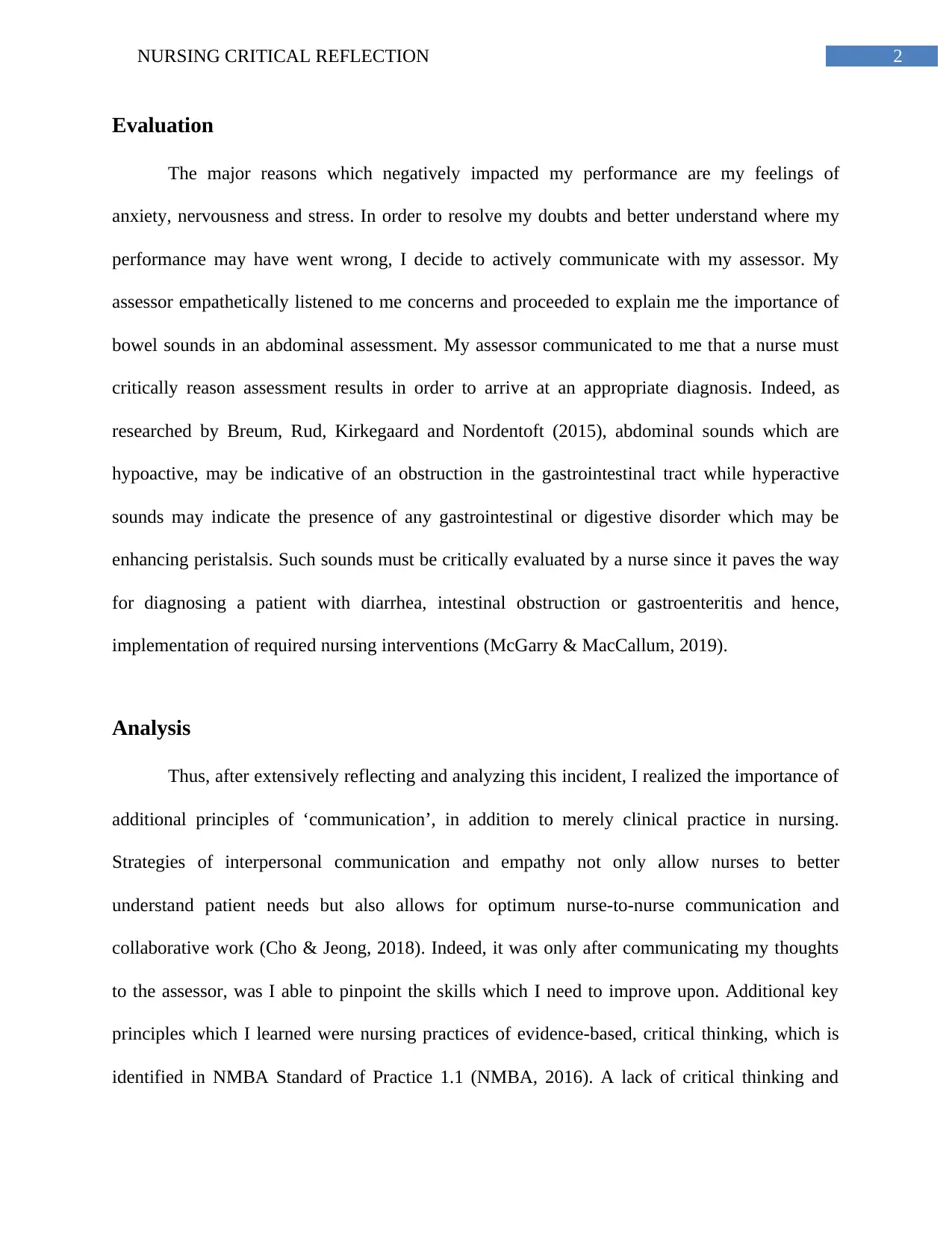
2NURSING CRITICAL REFLECTION
Evaluation
The major reasons which negatively impacted my performance are my feelings of
anxiety, nervousness and stress. In order to resolve my doubts and better understand where my
performance may have went wrong, I decide to actively communicate with my assessor. My
assessor empathetically listened to me concerns and proceeded to explain me the importance of
bowel sounds in an abdominal assessment. My assessor communicated to me that a nurse must
critically reason assessment results in order to arrive at an appropriate diagnosis. Indeed, as
researched by Breum, Rud, Kirkegaard and Nordentoft (2015), abdominal sounds which are
hypoactive, may be indicative of an obstruction in the gastrointestinal tract while hyperactive
sounds may indicate the presence of any gastrointestinal or digestive disorder which may be
enhancing peristalsis. Such sounds must be critically evaluated by a nurse since it paves the way
for diagnosing a patient with diarrhea, intestinal obstruction or gastroenteritis and hence,
implementation of required nursing interventions (McGarry & MacCallum, 2019).
Analysis
Thus, after extensively reflecting and analyzing this incident, I realized the importance of
additional principles of ‘communication’, in addition to merely clinical practice in nursing.
Strategies of interpersonal communication and empathy not only allow nurses to better
understand patient needs but also allows for optimum nurse-to-nurse communication and
collaborative work (Cho & Jeong, 2018). Indeed, it was only after communicating my thoughts
to the assessor, was I able to pinpoint the skills which I need to improve upon. Additional key
principles which I learned were nursing practices of evidence-based, critical thinking, which is
identified in NMBA Standard of Practice 1.1 (NMBA, 2016). A lack of critical thinking and
Evaluation
The major reasons which negatively impacted my performance are my feelings of
anxiety, nervousness and stress. In order to resolve my doubts and better understand where my
performance may have went wrong, I decide to actively communicate with my assessor. My
assessor empathetically listened to me concerns and proceeded to explain me the importance of
bowel sounds in an abdominal assessment. My assessor communicated to me that a nurse must
critically reason assessment results in order to arrive at an appropriate diagnosis. Indeed, as
researched by Breum, Rud, Kirkegaard and Nordentoft (2015), abdominal sounds which are
hypoactive, may be indicative of an obstruction in the gastrointestinal tract while hyperactive
sounds may indicate the presence of any gastrointestinal or digestive disorder which may be
enhancing peristalsis. Such sounds must be critically evaluated by a nurse since it paves the way
for diagnosing a patient with diarrhea, intestinal obstruction or gastroenteritis and hence,
implementation of required nursing interventions (McGarry & MacCallum, 2019).
Analysis
Thus, after extensively reflecting and analyzing this incident, I realized the importance of
additional principles of ‘communication’, in addition to merely clinical practice in nursing.
Strategies of interpersonal communication and empathy not only allow nurses to better
understand patient needs but also allows for optimum nurse-to-nurse communication and
collaborative work (Cho & Jeong, 2018). Indeed, it was only after communicating my thoughts
to the assessor, was I able to pinpoint the skills which I need to improve upon. Additional key
principles which I learned were nursing practices of evidence-based, critical thinking, which is
identified in NMBA Standard of Practice 1.1 (NMBA, 2016). A lack of critical thinking and
⊘ This is a preview!⊘
Do you want full access?
Subscribe today to unlock all pages.

Trusted by 1+ million students worldwide
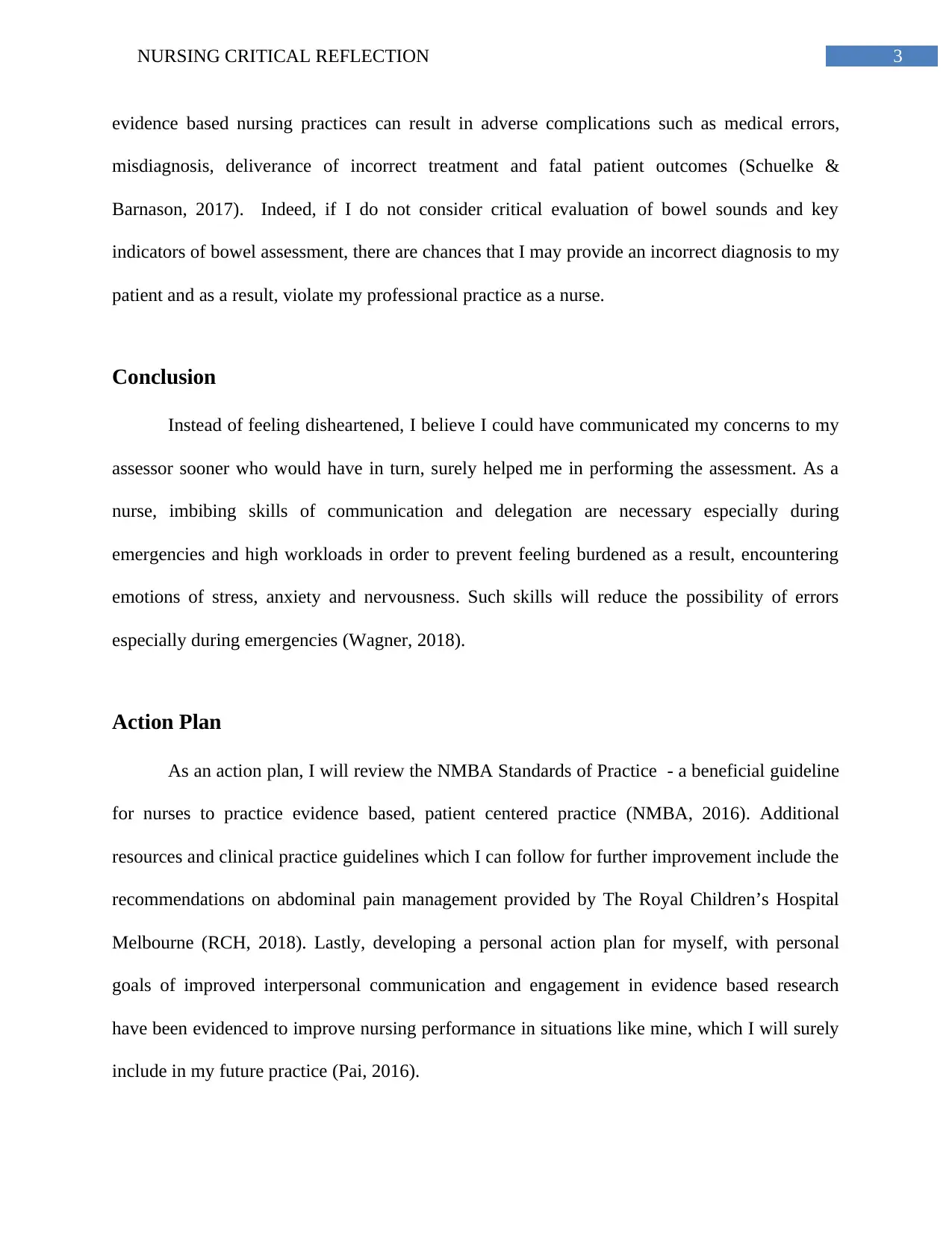
3NURSING CRITICAL REFLECTION
evidence based nursing practices can result in adverse complications such as medical errors,
misdiagnosis, deliverance of incorrect treatment and fatal patient outcomes (Schuelke &
Barnason, 2017). Indeed, if I do not consider critical evaluation of bowel sounds and key
indicators of bowel assessment, there are chances that I may provide an incorrect diagnosis to my
patient and as a result, violate my professional practice as a nurse.
Conclusion
Instead of feeling disheartened, I believe I could have communicated my concerns to my
assessor sooner who would have in turn, surely helped me in performing the assessment. As a
nurse, imbibing skills of communication and delegation are necessary especially during
emergencies and high workloads in order to prevent feeling burdened as a result, encountering
emotions of stress, anxiety and nervousness. Such skills will reduce the possibility of errors
especially during emergencies (Wagner, 2018).
Action Plan
As an action plan, I will review the NMBA Standards of Practice - a beneficial guideline
for nurses to practice evidence based, patient centered practice (NMBA, 2016). Additional
resources and clinical practice guidelines which I can follow for further improvement include the
recommendations on abdominal pain management provided by The Royal Children’s Hospital
Melbourne (RCH, 2018). Lastly, developing a personal action plan for myself, with personal
goals of improved interpersonal communication and engagement in evidence based research
have been evidenced to improve nursing performance in situations like mine, which I will surely
include in my future practice (Pai, 2016).
evidence based nursing practices can result in adverse complications such as medical errors,
misdiagnosis, deliverance of incorrect treatment and fatal patient outcomes (Schuelke &
Barnason, 2017). Indeed, if I do not consider critical evaluation of bowel sounds and key
indicators of bowel assessment, there are chances that I may provide an incorrect diagnosis to my
patient and as a result, violate my professional practice as a nurse.
Conclusion
Instead of feeling disheartened, I believe I could have communicated my concerns to my
assessor sooner who would have in turn, surely helped me in performing the assessment. As a
nurse, imbibing skills of communication and delegation are necessary especially during
emergencies and high workloads in order to prevent feeling burdened as a result, encountering
emotions of stress, anxiety and nervousness. Such skills will reduce the possibility of errors
especially during emergencies (Wagner, 2018).
Action Plan
As an action plan, I will review the NMBA Standards of Practice - a beneficial guideline
for nurses to practice evidence based, patient centered practice (NMBA, 2016). Additional
resources and clinical practice guidelines which I can follow for further improvement include the
recommendations on abdominal pain management provided by The Royal Children’s Hospital
Melbourne (RCH, 2018). Lastly, developing a personal action plan for myself, with personal
goals of improved interpersonal communication and engagement in evidence based research
have been evidenced to improve nursing performance in situations like mine, which I will surely
include in my future practice (Pai, 2016).
Paraphrase This Document
Need a fresh take? Get an instant paraphrase of this document with our AI Paraphraser
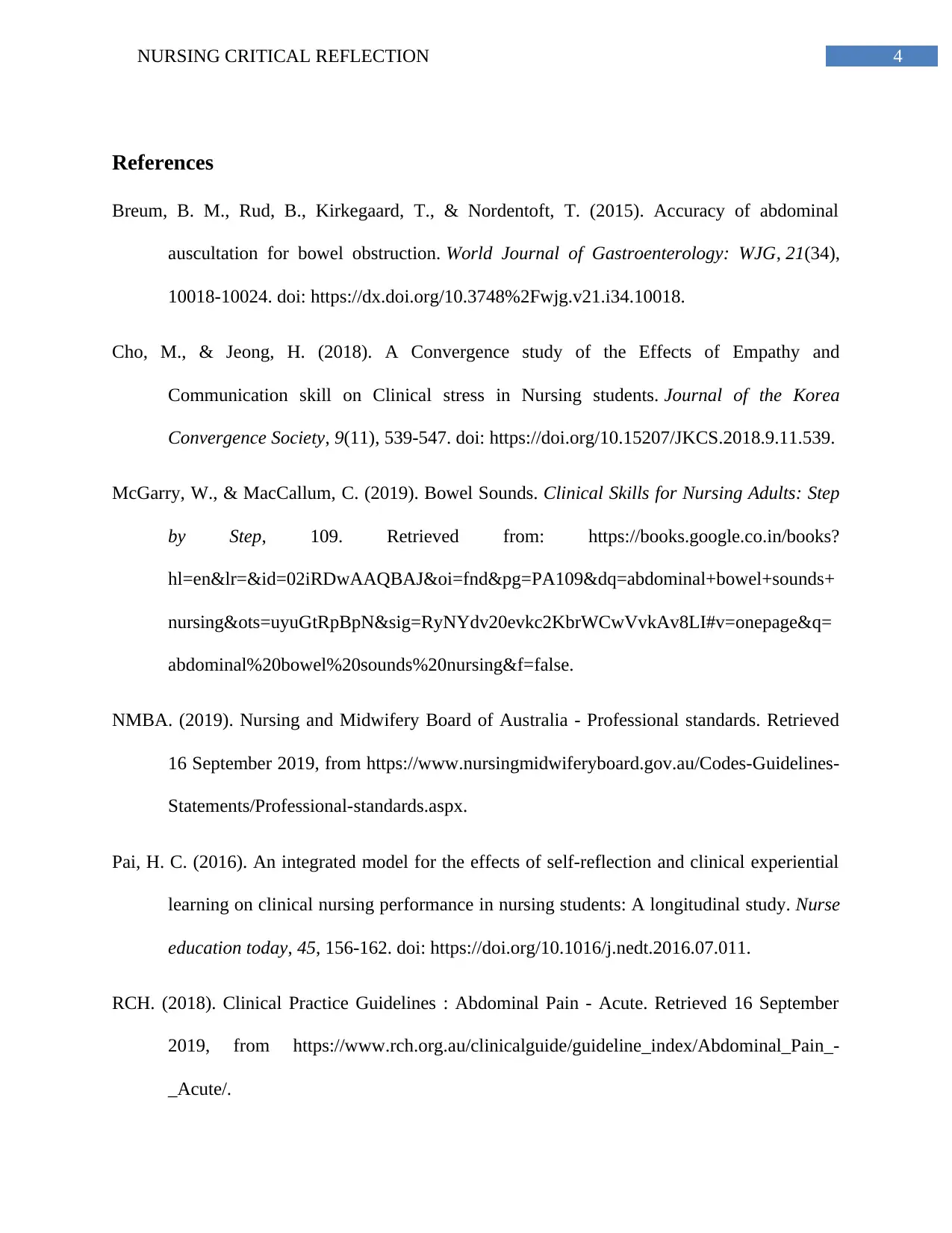
4NURSING CRITICAL REFLECTION
References
Breum, B. M., Rud, B., Kirkegaard, T., & Nordentoft, T. (2015). Accuracy of abdominal
auscultation for bowel obstruction. World Journal of Gastroenterology: WJG, 21(34),
10018-10024. doi: https://dx.doi.org/10.3748%2Fwjg.v21.i34.10018.
Cho, M., & Jeong, H. (2018). A Convergence study of the Effects of Empathy and
Communication skill on Clinical stress in Nursing students. Journal of the Korea
Convergence Society, 9(11), 539-547. doi: https://doi.org/10.15207/JKCS.2018.9.11.539.
McGarry, W., & MacCallum, C. (2019). Bowel Sounds. Clinical Skills for Nursing Adults: Step
by Step, 109. Retrieved from: https://books.google.co.in/books?
hl=en&lr=&id=02iRDwAAQBAJ&oi=fnd&pg=PA109&dq=abdominal+bowel+sounds+
nursing&ots=uyuGtRpBpN&sig=RyNYdv20evkc2KbrWCwVvkAv8LI#v=onepage&q=
abdominal%20bowel%20sounds%20nursing&f=false.
NMBA. (2019). Nursing and Midwifery Board of Australia - Professional standards. Retrieved
16 September 2019, from https://www.nursingmidwiferyboard.gov.au/Codes-Guidelines-
Statements/Professional-standards.aspx.
Pai, H. C. (2016). An integrated model for the effects of self-reflection and clinical experiential
learning on clinical nursing performance in nursing students: A longitudinal study. Nurse
education today, 45, 156-162. doi: https://doi.org/10.1016/j.nedt.2016.07.011.
RCH. (2018). Clinical Practice Guidelines : Abdominal Pain - Acute. Retrieved 16 September
2019, from https://www.rch.org.au/clinicalguide/guideline_index/Abdominal_Pain_-
_Acute/.
References
Breum, B. M., Rud, B., Kirkegaard, T., & Nordentoft, T. (2015). Accuracy of abdominal
auscultation for bowel obstruction. World Journal of Gastroenterology: WJG, 21(34),
10018-10024. doi: https://dx.doi.org/10.3748%2Fwjg.v21.i34.10018.
Cho, M., & Jeong, H. (2018). A Convergence study of the Effects of Empathy and
Communication skill on Clinical stress in Nursing students. Journal of the Korea
Convergence Society, 9(11), 539-547. doi: https://doi.org/10.15207/JKCS.2018.9.11.539.
McGarry, W., & MacCallum, C. (2019). Bowel Sounds. Clinical Skills for Nursing Adults: Step
by Step, 109. Retrieved from: https://books.google.co.in/books?
hl=en&lr=&id=02iRDwAAQBAJ&oi=fnd&pg=PA109&dq=abdominal+bowel+sounds+
nursing&ots=uyuGtRpBpN&sig=RyNYdv20evkc2KbrWCwVvkAv8LI#v=onepage&q=
abdominal%20bowel%20sounds%20nursing&f=false.
NMBA. (2019). Nursing and Midwifery Board of Australia - Professional standards. Retrieved
16 September 2019, from https://www.nursingmidwiferyboard.gov.au/Codes-Guidelines-
Statements/Professional-standards.aspx.
Pai, H. C. (2016). An integrated model for the effects of self-reflection and clinical experiential
learning on clinical nursing performance in nursing students: A longitudinal study. Nurse
education today, 45, 156-162. doi: https://doi.org/10.1016/j.nedt.2016.07.011.
RCH. (2018). Clinical Practice Guidelines : Abdominal Pain - Acute. Retrieved 16 September
2019, from https://www.rch.org.au/clinicalguide/guideline_index/Abdominal_Pain_-
_Acute/.
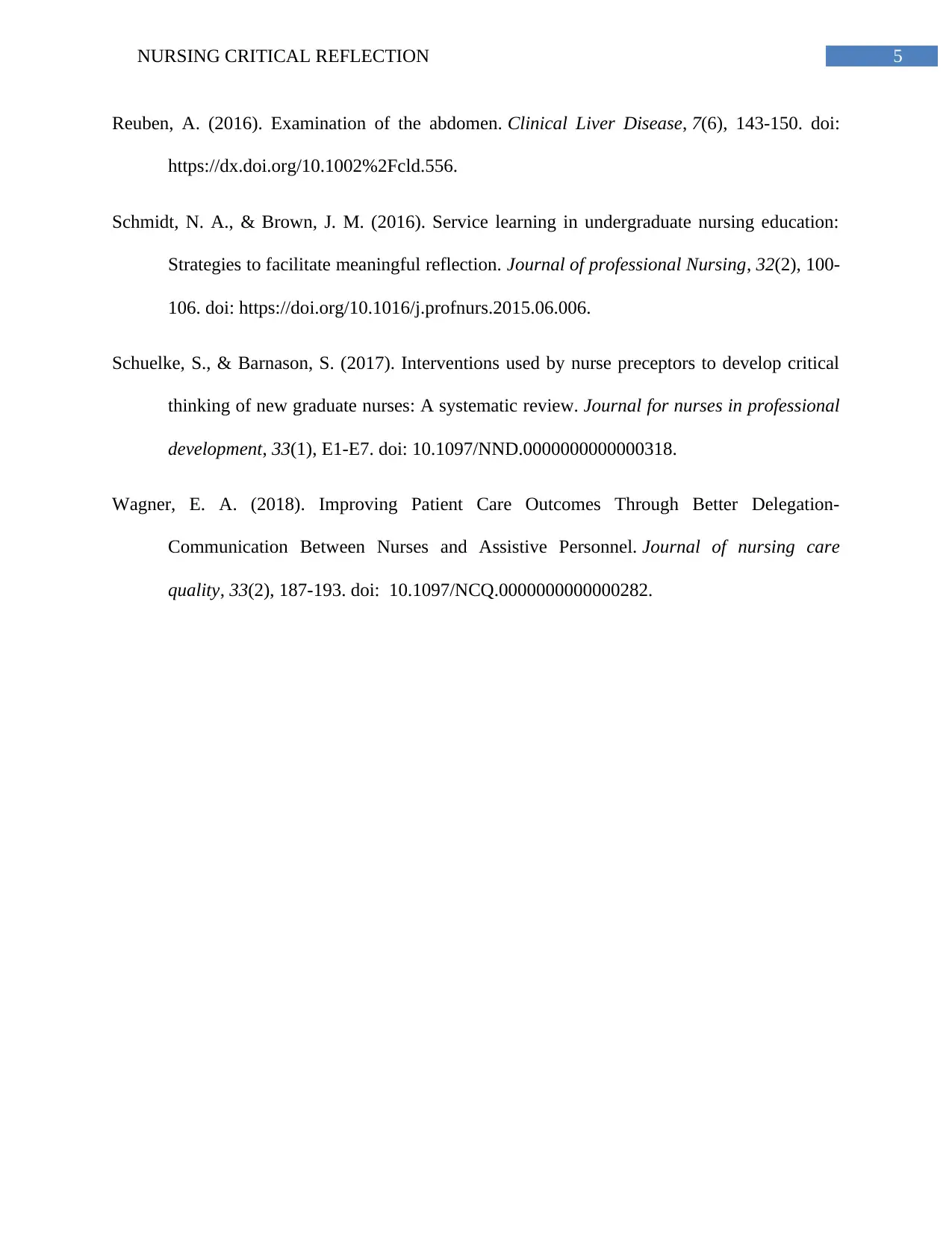
5NURSING CRITICAL REFLECTION
Reuben, A. (2016). Examination of the abdomen. Clinical Liver Disease, 7(6), 143-150. doi:
https://dx.doi.org/10.1002%2Fcld.556.
Schmidt, N. A., & Brown, J. M. (2016). Service learning in undergraduate nursing education:
Strategies to facilitate meaningful reflection. Journal of professional Nursing, 32(2), 100-
106. doi: https://doi.org/10.1016/j.profnurs.2015.06.006.
Schuelke, S., & Barnason, S. (2017). Interventions used by nurse preceptors to develop critical
thinking of new graduate nurses: A systematic review. Journal for nurses in professional
development, 33(1), E1-E7. doi: 10.1097/NND.0000000000000318.
Wagner, E. A. (2018). Improving Patient Care Outcomes Through Better Delegation-
Communication Between Nurses and Assistive Personnel. Journal of nursing care
quality, 33(2), 187-193. doi: 10.1097/NCQ.0000000000000282.
Reuben, A. (2016). Examination of the abdomen. Clinical Liver Disease, 7(6), 143-150. doi:
https://dx.doi.org/10.1002%2Fcld.556.
Schmidt, N. A., & Brown, J. M. (2016). Service learning in undergraduate nursing education:
Strategies to facilitate meaningful reflection. Journal of professional Nursing, 32(2), 100-
106. doi: https://doi.org/10.1016/j.profnurs.2015.06.006.
Schuelke, S., & Barnason, S. (2017). Interventions used by nurse preceptors to develop critical
thinking of new graduate nurses: A systematic review. Journal for nurses in professional
development, 33(1), E1-E7. doi: 10.1097/NND.0000000000000318.
Wagner, E. A. (2018). Improving Patient Care Outcomes Through Better Delegation-
Communication Between Nurses and Assistive Personnel. Journal of nursing care
quality, 33(2), 187-193. doi: 10.1097/NCQ.0000000000000282.
⊘ This is a preview!⊘
Do you want full access?
Subscribe today to unlock all pages.

Trusted by 1+ million students worldwide
1 out of 6
Related Documents
Your All-in-One AI-Powered Toolkit for Academic Success.
+13062052269
info@desklib.com
Available 24*7 on WhatsApp / Email
![[object Object]](/_next/static/media/star-bottom.7253800d.svg)
Unlock your academic potential
Copyright © 2020–2026 A2Z Services. All Rights Reserved. Developed and managed by ZUCOL.





